 The state is playing a bigger part in economies. Better markets help it avoid bureaucratic bloat while remaining responsive, and transparent.
The state is playing a bigger part in economies. Better markets help it avoid bureaucratic bloat while remaining responsive, and transparent.1) MODERNIZATION: New force
In a typical government currently, the agriculture ministry might be planning a system tracking cattle transfers while colleagues in Education invite tenders for an upgraded registry of classroom assistants while counterparts in Vehicle Licensing model a better way of interfacing to insurers while trying to trade clerical staff with other departments in line with fluctuating needs. Multiple departments will be hauled into modernizing welfare. This can all be a struggle; Japan’s government committed to digitize all its processes by 2003, in 2020, just 7.5% were online.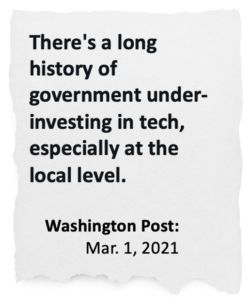
POEMs (Public Offical E-Markets) would bring sophisticated tools for dispersed transactions, and its huge capacity to all these issues. Corporates winning a concession would have an immediate business need – and a legal right – to get public agencies ready to interact with Modern Markets.
Even if POEMs fails, the foundations would remain; so official databases would be up-to-date and interoperable. Officials would have been trained, and public expectations of digital services shaped, all funded by POEMs’ operators.
And government should be ready for the information POEMs generates. How far are people traveling for work? When? What was today’s utilization of teachers? How many foreigners used POEMs to book a room last night? As ever with POEMs, we can’t say how this micro-data will get used. Nor can we predict the beneficiaries of more granular public procurement.
2) SERVICES: De-centralized, accountable, responsive
Centrally managed, 9-to-5, workers based at City Hall may be a poor way of meeting residents’ needs. With POEMs, City Halls could act more as a certifying authority. So individual fire inspectors, child support workers, leisure assistants, landscapers, social care drivers, and others are vetted and supervised. But each sells their hours as they wish around their community, possibly within guaranteed minimums each week. Each could be trading other skills as well.
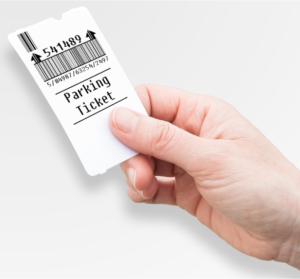 In parallel, budgets could be devolved down to local level. So the a ward might get $25,000 a year for street wardens, youth leaders, or street cleaners. A panel of locals authorized to make publicly listed bookings is appointed. If teens are being rowdy outside the shops after school, perhaps a couple of wardens patrolling for 90 minutes on the next three days? Parking abuse expected during Saturday’s big game? Twenty City Hall approved enforcement officers should keep traffic flowing. And so on.
In parallel, budgets could be devolved down to local level. So the a ward might get $25,000 a year for street wardens, youth leaders, or street cleaners. A panel of locals authorized to make publicly listed bookings is appointed. If teens are being rowdy outside the shops after school, perhaps a couple of wardens patrolling for 90 minutes on the next three days? Parking abuse expected during Saturday’s big game? Twenty City Hall approved enforcement officers should keep traffic flowing. And so on.
A parallel economy within POEMs could act as a form of transferable voucher for services. A man might provide home painting for local housebound people in return for electronic parallel tokens he transfers to his, elderly father hundreds of miles away, who uses them to pay for a support worker when he wants to swim.
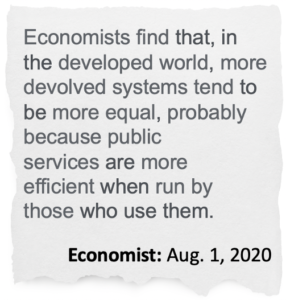 Some services may no longer need government. City Bike hire schemes are everywhere. They provide uniform, unexciting, space-consuming, high maintenance, sets of wheels. But POEMs’ bike hire markets could have a diverse, responsive, range of bicycles – and people to instantly deliver or collect them – with minimal sidewalk clutter.
Some services may no longer need government. City Bike hire schemes are everywhere. They provide uniform, unexciting, space-consuming, high maintenance, sets of wheels. But POEMs’ bike hire markets could have a diverse, responsive, range of bicycles – and people to instantly deliver or collect them – with minimal sidewalk clutter.
There are big questions here about protecting jobs versus on-tap services. Those are for elected officials to grapple. POEMs is simply plumbing to strip out inefficiency.
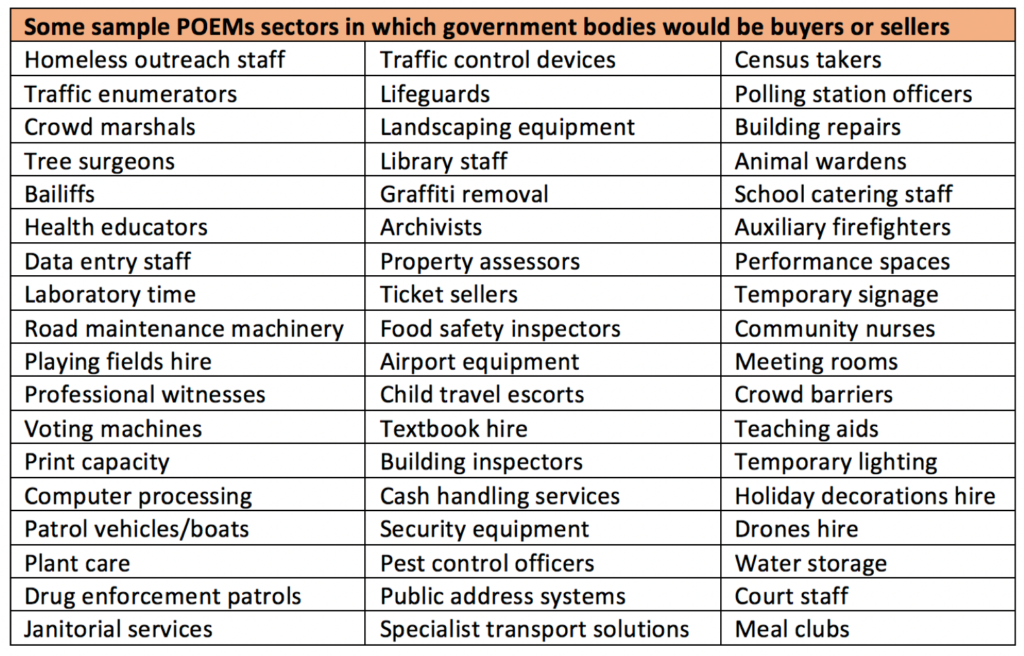
3) LEVERS: Test, track, trajectory
POEMs would allow any market intervention by policymakers to be trialed incrementally then scaled swiftly. That’s increasingly important: the world launched 1,600 novel social protection programs in 2020. Some obvious areas for experimentation include:
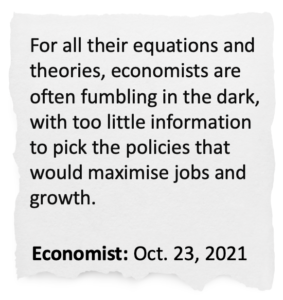 Tax: If a user wishes, POEMs could calculate and transfer deductions as each payment by a buyer was sent to a seller. That facilitates micro-targeting of tax breaks. Installation of insulation of older properties? Cab rides to school from isolated areas by certified childcare drivers? Shopping collection for anyone discharged from hospital last week? Each could be made cheaper instantly.
Tax: If a user wishes, POEMs could calculate and transfer deductions as each payment by a buyer was sent to a seller. That facilitates micro-targeting of tax breaks. Installation of insulation of older properties? Cab rides to school from isolated areas by certified childcare drivers? Shopping collection for anyone discharged from hospital last week? Each could be made cheaper instantly.- Welfare: POEMs could run any model of assistance or early interventions using its validation of users, access to official databases, and payment machinery.
- Leveraged spending: This atomization of provision could have wider impacts. The “Preston Model” of buying public services from the most local contractors creates a multiplier of funds recirculating through local economies.
- Social support: A program like Italy’s Citizen’s Income Scheme, topping up wages of people who are not earning enough could flow through POEMs of course. Bolsa Familia, which rewards Brazilian Families for sending the kids to school would require only a link from class registers to POEMs to bring all the system’s protections, opportunities, and gossamer overheads to bear on administration. Replication is simplified.
4) REGULATION: Sidestepping battles
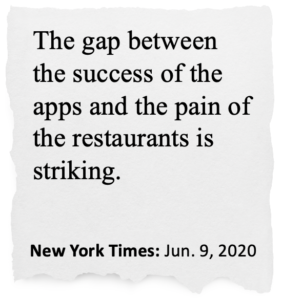 Silicon Valley’s platforms have become essential economic infrastructure. So officials feel they have to curb their egregious abuses. Deep-pocketed, ingenious, companies with few ethics then fight back. It’s never ending.
Silicon Valley’s platforms have become essential economic infrastructure. So officials feel they have to curb their egregious abuses. Deep-pocketed, ingenious, companies with few ethics then fight back. It’s never ending.
During the Covid pandemic, for example, multiple US cities capped the charges food-ferrying apps deduct from restaurants that cook the meals. It was controversial, with some restauranteurs fearing loss of interest from the app companies would cut their channels to take-out customers.
Meanwhile, Democrat Senators urged antitrust regulators to block Uber from taking over Grubhub. And Republicans were successfully badgered by Uber, Lyft and Postmates to draw up a bill undermining California’s legislation to raise standards for gig workers. Within months of that legislation, Sacramento lawmakers were pushed into dozens of rewrites. Meantime, Congress was asking whether Amazon lied about its use of small sellers’ data.
 POEMs would marginalize many of these conflicts. Sure, if eateries, diners, and cyclists think the commercial apps are worth 30% or so commission, they should use them. But, if they’d rather pay around 2% in POEMs, and enjoy all the other benefits of such deep, broad, public-centric, markets they can do that instead. Or as well.
POEMs would marginalize many of these conflicts. Sure, if eateries, diners, and cyclists think the commercial apps are worth 30% or so commission, they should use them. But, if they’d rather pay around 2% in POEMs, and enjoy all the other benefits of such deep, broad, public-centric, markets they can do that instead. Or as well.
There was a time when officials had to regulate a plethora of, potentially damaging, domestic electricity generator manufacturers. Now most of us opt for a public supply which is inherently regulated. Jurisdictions moved on from fighting fractious hustlers to shaping a genuinely enabling service. It’s time to do the same for markets.
5) POLITICIANS: New checks
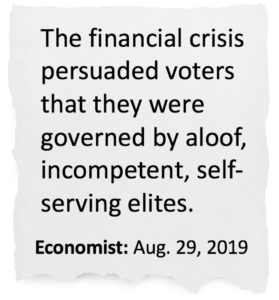 POEMs should be democracy-enhancing. It creates a new institution; the operating consortium, made up of multi-nationals; big – and brand-sensitive – enough to stay above political coercion. The muscular independence users should expect is exemplified in broadcasters’ reaction to 1988 UK legislation banning the voices of leaders of Irish republican groups from airwaves. Public and commercial stations, each dependent on a government license, quickly subverted the ban by having actors lip-synch a forbidden speaker’s words.
POEMs should be democracy-enhancing. It creates a new institution; the operating consortium, made up of multi-nationals; big – and brand-sensitive – enough to stay above political coercion. The muscular independence users should expect is exemplified in broadcasters’ reaction to 1988 UK legislation banning the voices of leaders of Irish republican groups from airwaves. Public and commercial stations, each dependent on a government license, quickly subverted the ban by having actors lip-synch a forbidden speaker’s words.
A well-run POEMs will likewise have an overarching need to retain customers’ trust by demonstrating independence from government. Responsible politicians will want the enabling concession to specify:
- Inspectability: POEMs would normally only display data like demand, supply, and pricing in ways that stop an individual user’s activities being deduced. Public agencies could be ruled exempt from that protection. So, if a voter believes City Hall is redlining publicly funded tutoring for instance, they can break down exact bookings made by any official.
- Voting: POEMs would be actively checking identies. Unlike programs such as India’s Aadhaar cards which require only one-time validation, a POEMs user will constantly be interacting with counterparts, each of whom electronically confirms identity when acknowledging the transaction completed. This checking is driven by a desire to earn or buy. But, as a by-product, it could be used to facilitate validated voting through POEMs.
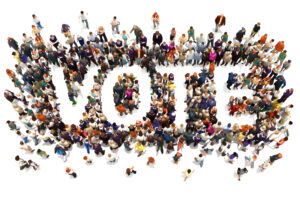 Petitions: Aside from official polls, any POEMs user might also be able to set up a ballot seeking – as one example – neighborhood agreement on Sunday road closures to give children a place to play. The concession might stipulate that anyone achieving, say, 50% positive votes locally is guaranteed a hearing in front of local government.
Petitions: Aside from official polls, any POEMs user might also be able to set up a ballot seeking – as one example – neighborhood agreement on Sunday road closures to give children a place to play. The concession might stipulate that anyone achieving, say, 50% positive votes locally is guaranteed a hearing in front of local government.
Politicians might lose leverage in other ways from POEMs. An independent central bank makes economic booms harder to engineer at election time. POEMs’ operators would likewise have every reason to resist any politically motivated manipulation in the micro-economy.
And voter suppression would become harder; campaign groups simply need to get target populations trading on the platform in a way that requires counterparties to constantly confirm the identity of the account holder. Other forms of corruption could be minimized. If political kickbacks are enabling sweatshop labor, well-behaved manufacturers can start booking validated workers through POEMs. The system can also run a market for independently approved, randomized, inspectors. Because of these factors, some governments may need to be pressured to adopt POEMs. That is covered in our briefing about POEMs for unstable economies.
